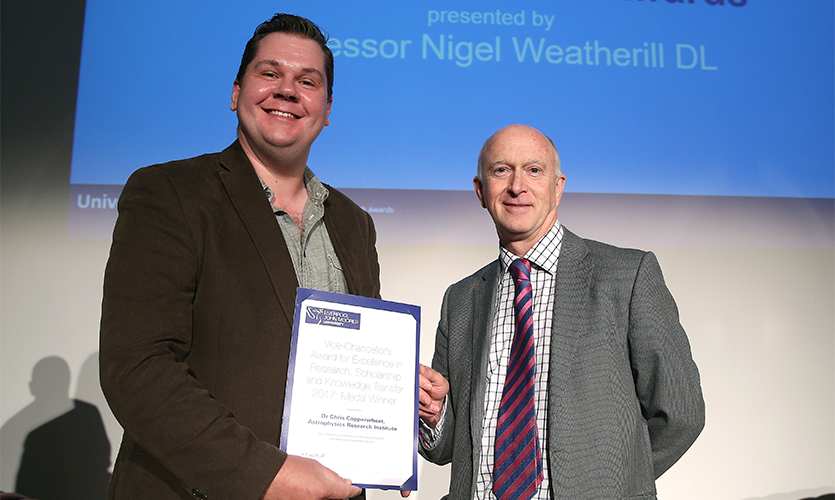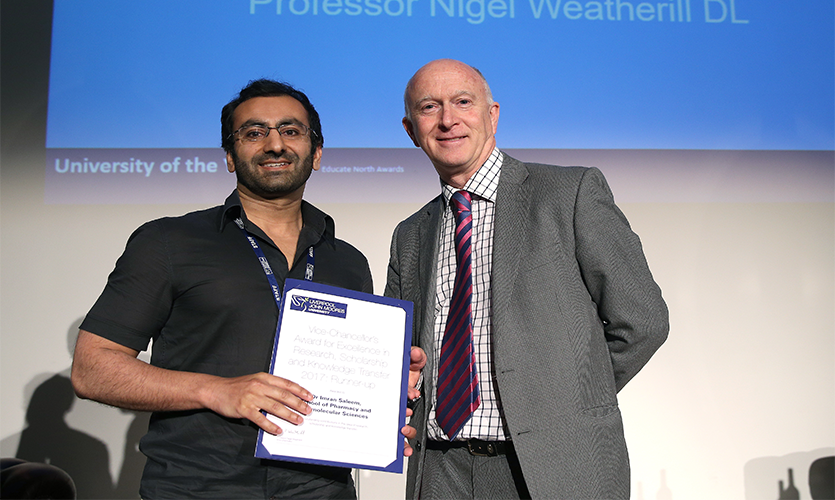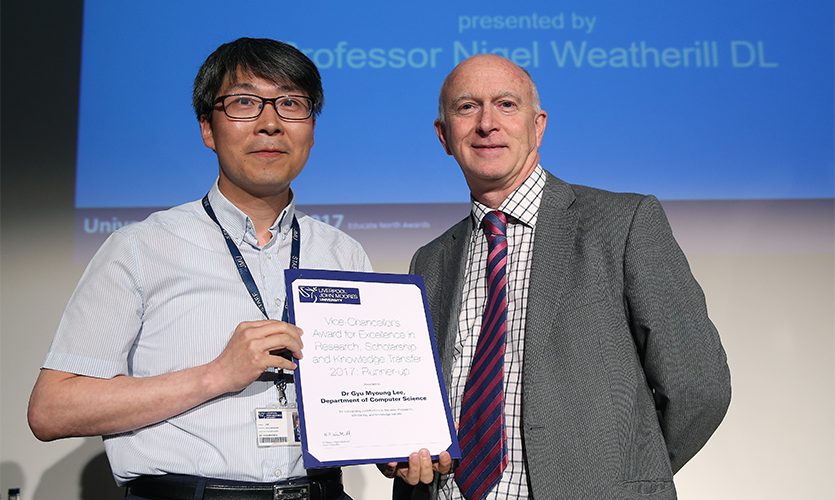Recognising excellence in research
Each year LJMU presents its prestigious Vice-Chancellor’s Awards for Excellence in Research, Scholarship & Knowledge Transfer to staff who are using research to increase our knowledge and understanding of key issues, and develop innovative solutions to challenges facing society today. This year’s recipients are worthy winners, and their exciting work reflects the vibrant research community in operation across the University.
The prestigious Vice-Chancellor’s Medal was awarded to Dr Chris Copperwheat, who leads gravitational wave and exoplanet research in the Astrophysics Research Institute.
Dr Copperwheat took up his permanent role as Liverpool Telescope (LT) Astronomer in Charge in 2015, and since then he has published 17 high-impact refereed papers on different aspects of his research, including the use of new gravitational wave science and the detailed science case for the double-sized successor facility to the University’s Liverpool Telescope, currently the world’s largest fully robotic telescope.
By harnessing the unique facilities of the Liverpool Telescope, Dr Copperwheat enabled LJMU to play a key role in the biggest astronomical discovery of 2017: the discovery of the TRAPPIST-1 system of seven exo-Earths, just 40 light-years (235 trillion miles) away. This is the first time that so many Earth-sized planets have been found orbiting around the same star, and the research, first published in Nature, made headlines around the world.
Dr Copperwheat also recently secured Large Synoptic Survey Telescope (LSST) Associate Principal Investigator status. LSST is a $2-billion US-led project which is surveying the entire sky with an 8-m class telescope every three nights. Only 100 UK positions were funded by the Science and Technologies Facilities Council (STFC) and as one of only two ARI staff to be selected, this status provides a long term path for his excellent research. Dr Copperwheat has a proven record in leveraging grant funding too, having won £375,000 to support Liverpool Telescope operations plus a £81,000 (PI) Newton fund award for collaborative work with astronomers in Thailand.
Given that he is an Early Career Researcher, these are all exceptional achievements, as the Head of ARI, Professor Chris Collins explains: “Dr Copperwheat’s recent achievements are rapidly helping to establish LJMU as an agenda-setting institution in time-domain astrophysics and at the cutting edge of this science worldwide. His achievements prepare the ground for the ARI to exploit new global opportunities, such as LSST, which will continue to enhance LJMU’s reputation as a world leader in a science area of fundamental importance.”
Dr Imran Saleem, Reader in Nanomedicine in the School of Pharmacy and Biomolecular Sciences, received a Vice-Chancellor’s Award for his research on drug delivery and nanomedicine.
Since joining LJMU in 2009, Dr Imram has published 37 peer-reviewed papers, 4 book chapters and 40+ conference abstracts alongside his busy teaching schedule. His major research involves the pulmonary delivery of a mucosal nanocarrier vaccine for pneumonia and as part of this work he has formed collaborations with world-leading groups, such as the Liverpool School of Tropical Medicine, and Instituto Butantan, Brazil. His research has the potential to offer needle-free vaccination, and eliminate cold-chain requirements while maintaining antigen stability and integrity. The importance of his work is reflected in the grants he has secured, including £570,000 from the Medical Research Centre (MRC).
Dr Gyu Myoung Lee, Department of Computer Science, received a Vice-Chancellor’s Award for his research on the Internet of Things, green IT, cloud computing, and emerging technologies and networks.
Dr Lee joined LJMU in 2014 and since then has generated a total of 37 quality research publications, presented 20 conference papers, served on seven journals and is a recognised expert on the Internet of Things. He has also secured over £350,000 in research income from funding bodies such as EU Horizon 2020 and the Korean government. “In Computer Science a good conference paper can have more impact, influence and citations, than a journal paper, due to the fast moving nature of the field,” explains his colleague Dr David England. “These contributions mean that Dr Lee is our most prolific research author.”





